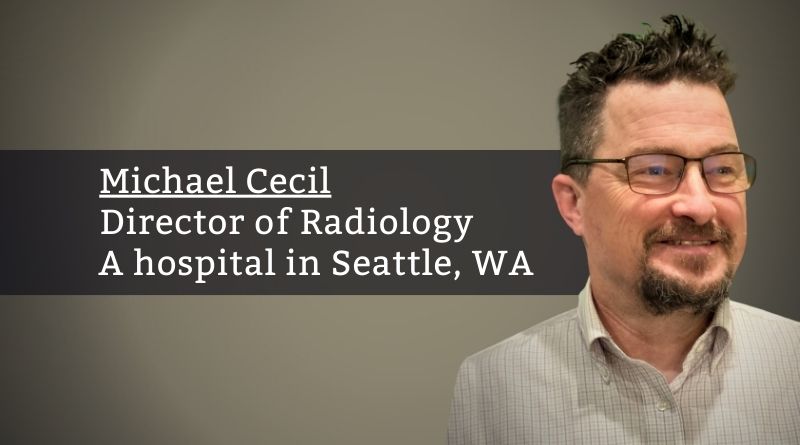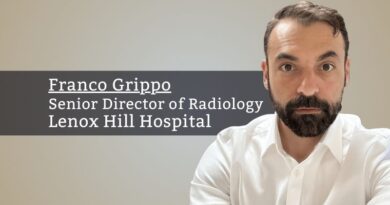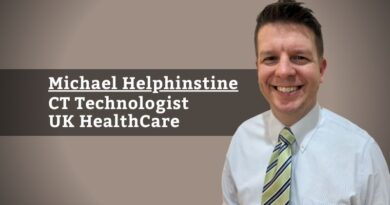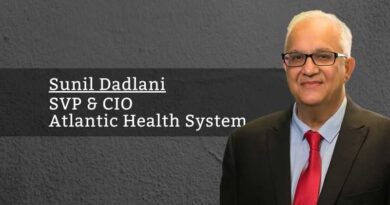Lessons Healthcare Should Learn from Social Media
By Michael Cecil MBA RT(R)(MR), Director of Radiology, a hospital in Seattle, WA
In the 1987 film “Wall Street” Michael Douglas’s character, Gordon Gecko, stated “greed, for the lack of a better word, is good”. He made this claim to support the idea that our advances as a country were directly attributable to the greed of mankind. Just look at the amazing technology available in healthcare to see that, at least at some point in time, Gordon’s statement rang true for us as well. It’s incredible to think that we’ve only had MRI machines for 42 years and CT scans for just 50 years. And all the amazing breakthroughs in medicine that were developed because of what these technologies can see. The creation of these machines was not 100% altruistic and the advances made to them over time to make them more hi-tech and faster weren’t done just to improve outcomes.
In this instance, regardless of your political views on capitalism, we could all agree that greed just might have done some good. Greed in healthcare is prevalent on all sides, vendors, administrators, staff, the government, insurance companies, the legal system, etc. and they all want their piece of the pie. And when someone finds a way to get a larger slice, you better believe they will; that drives more innovation. At some point, our primary consumer will say, ‘enough is enough’ and the spending will have to stop. Coming out of the COVID pandemic, we may have reached this point. This past year we have seen a massive staff exodus, decreased revenues, increased costs of care, and we see that continuing to operate the business of healthcare the way we have always done, is illogical. So how can we leverage technology from the world outside of healthcare to improve the patient experience?
Healthcare systems need to develop solutions designed to address the shortfall in human capital without allowing startup costs to deter them.
True, greed is already present in healthcare. While COVID has led to much needed pay increases to frontline staff who have gone years without a raise that matches the annual cost of living increases; it took staff departures, closures, and negative impacts on patient care before that happened. And at the other end? Why does anyone in healthcare need to earn seven figures a year or more? We collectively seem to have forgotten that everything is paid for by the patient. Everything. We owe it to them to start exploring new ways to do our work and leveraging the tools created for capitalist purposes for the improvement of healthcare.
Healthcare systems need to develop solutions designed to address the shortfall in human capital without allowing startup costs to deter them. We need to look at who is doing what work, day in and day out. Who is placing IVs? Who is taking vitals? Who is doing procedures? And on and on. Once we know what the work is and who is doing it, we need to figure out what work can be improved by technology. One easy solution: self-scheduling platforms for appointments. It’s ridiculous that you can book travel on your own to anywhere in the world, but you can’t book a CT by yourself.
There are plenty of solutions outside of healthcare that could be applied today. Artificial Intelligence, Deep Learning, etc., should be looked at for all aspects of our healthcare systems. We could have AI screening patient records and results to triage our schedules and ensure no information is missed. AI to pre-read our images, reports, specimens, etc., to reduce defects and mistakes. Intuitive systems take a provider’s report or results typically filled with medical jargon and translate it into information that is understandable to the patient and their family, and in a tech format that is accessible to them. And we need to mandate the connectivity of all electronic medical records, PACS, etc., requiring full and on-demand access to any previous records regardless of where it was done, whenever it’s needed. I can search Google, Yahoo, etc. for any information and at the same time, I can’t get results from a year old blood test without signing a release and communicating directly with the facility.
What if we went all in? Fully leveraging the technologies that made the creators of Google, Facebook, Instagram, etc., insanely rich? In our world today, a large majority of the population live their lives entirely for the world to see, we only have to pull up any number of applications or social media platforms and we can learn what someone had for lunch, whether they are a cat or dog person, what music they like, even down to how warm they prefer their home. A simple algorithm could pull all this data, prior to a patient’s arrival, checking them in for all their appointments, alerting the caregivers’ topics to avoid, important dates, room color, background music, and setting room temperatures. An AI could screen them at the beginning of the process by asking a few questions, getting vitals from smartwatches, etc., to make the care teams apprised of potential illnesses. Geofencing technology would allow these changes to precede them for all of their appointments while at the facility. Smart sensors can detect their medication compliance so that it can be discussed during visits. All their lives that they have shared online can be picked through for keys to what they can do to improve their own health. And when they are done, their car can be notified so it will be ready when the patient’s visits are completed. A 100% automatically customized experience based on all their smart devices, posts, likes, and dislikes. Surveys would be a thing of the past because the care team would know as soon as the patient posted about their experience. We would finally know our patients and how they wish to be known on a much deeper level.



